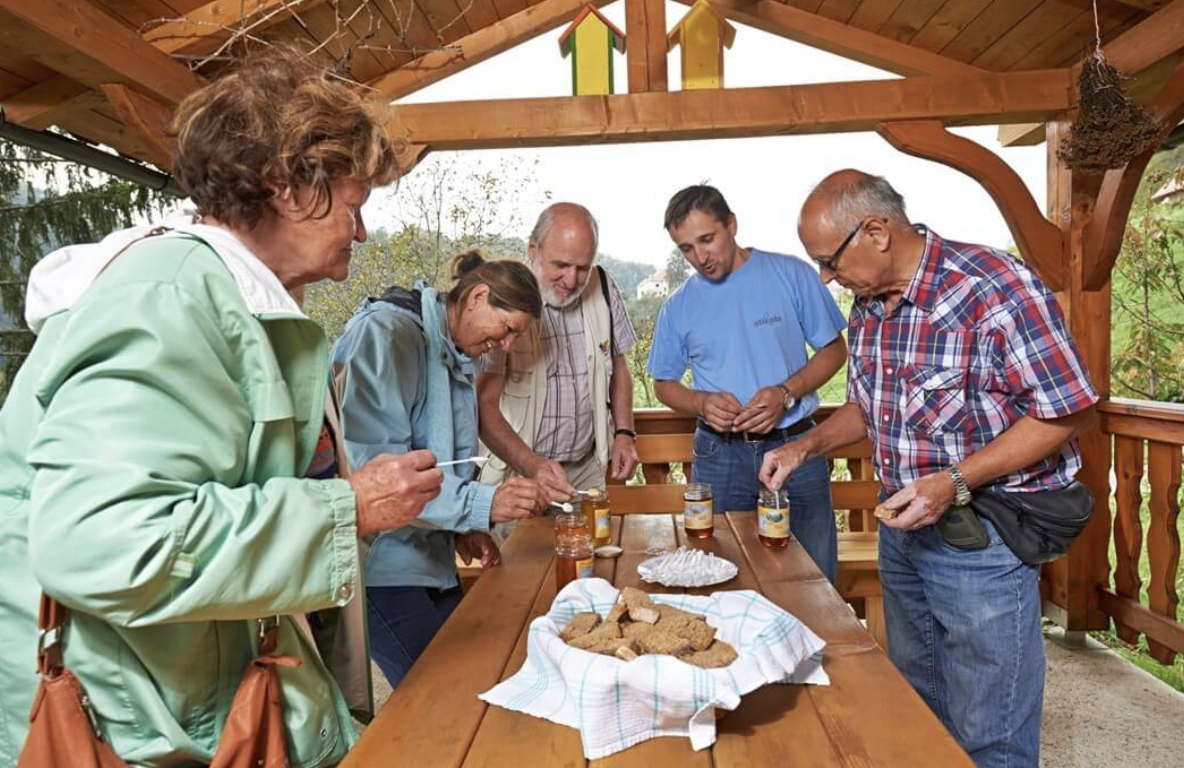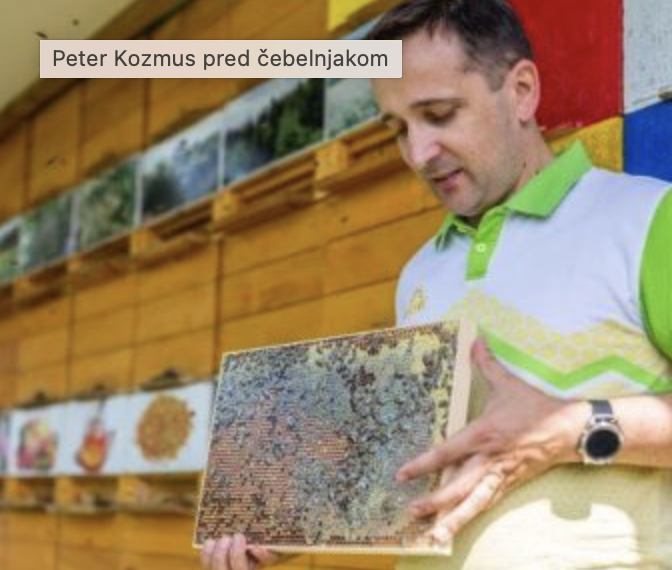[Seminar Blog] Slovenia and Its Honeybee Practices: Small Country, Big Beekeeping Successes2/2/2022
Written by: Patrick McNamara and Jonna Sanders Dr. Peter Kozmus is a zoologist, author, diplomat, and worldwide advocate for political action to protect honeybees, insects, and insect diversity. He is a leading figure at the world honeybee association, Apimondia, as well as among Europe’s Entomologists focused upon honeybee genetics. Since 2011, Dr. Kozmus has been the Director of the Republic of Slovenia’s Carniolan Bee Breeding program at the Slovenian Beekeeping Association, Čebelarska zveza Slovenije. This program strives to protect Apis mellifera carnica, the Carniolan bee, which is the indigenous honeybee subspecies in Slovenia. A graduate of the Biotechnical Fakulteta at Slovenia’s University of Ljubljana, his Doctoral research explored the morphological and molecular markers of bumblebees. In 2014, he joined the Slovenian Beekeeping Association, which is a honeybee industry advocacy center, a research institute, and a powerful political ecological voice in Slovenia. In 2017, Dr. Kozmus was elected to the position of Vice President of Apimondia. Dr. Kozmus has been working in Europe for the past decade, helping lead Slovenia’s scientific experts to educate about the impact of pesticide use on pollinators, and even helping convince the European Union in 2011 to limit the use of the neonicotinoid class of pesticides. In 2017, he successfully lobbied on behalf of the Republic of Slovenia for the creation of a World Bee Day, which is now celebrated on May 20th. This date honors the birthday of Slovenia’s great honeybee educator, Anton Janša (1734-1773), who was the world’s first modern Instructor of Beekeeping.
A Nation of Beekeepers Dr. Kozmus has been very involved with bee advocacy on a global scale, but his efforts are seen best in his home country of Slovenia. In our Departmental seminar he discussed Slovenia’s strong beekeeping culture. Slovenia is a small country of roughly 2 million people, including 11,000 beekeepers. This is about fifteen times more beekeepers per capita than the USA, according to 2021 USDA estimates. Slovenian beekeepers typically produce over 1500 metric tons of honey annually. This amount is similar to the 2019 production of the State of Washington, which, with a population of 7.5 million residents, is nearly four times as populous as Slovenia (National Agricultural Statistics Service, 2021). Despite this huge production rate, this is less than half of the honey consumed annually in the country; it is safe to say Slovenia loves its honey and its honeybees. Ongoing Challenges and Successes Despite its honey-loving culture, Dr. Kozmus still has some concerns about Slovenia’s beekeeping status. In the U.S., the main beekeeping concerns are colony diseases, pesticides and insect parasitoids. While these all may be relevant issues in Slovenia, Dr. Kozmus seemed to be primarily concerned about the impact of honeybee parasitoids, particularly the Varroa destructor mite, as well as the European and American Foulbrood diseases. Slovenia is carefully monitoring honeybee colony health, and in a nation where so many beekeepers are active, the beekeeping clubs and Beekeeping Association of Slovenia work together toward a community health model of beekeeping. On a positive note, Dr. Kozmus explained about the Slovenian government’s ongoing and extensive economic and logistical support for beekeepers, even during the COVID-19 pandemic. The Slovenian government recognizes that beekeepers are a critical lynchpin in the agricultural health of Slovenia, and supported their unrestricted movement to the fields for work, even while the rest of the country was restricted at their residences. Educating the Next Generation of Bee Lovers One main aspect of Dr. Kosmus’ ongoing efforts is to educate young people, primarily children and young people, about the importance and value of beekeeping in their country. A big goal and success story for Slovenia is the integration of bee education into the national elementary and secondary school curriculum, which includes beekeeping clubs at the majority of schools. In taking the lead with beekeeping education in the primary and secondary schools,, Slovenia is making great strides towards inspiring more, and younger, future beekeepers amongst the younger generations. Different Hives for a Different Folk Dr. Kozmus also discussed Slovenia’s unique AŽ beehives and colorful bee houses, which provide a colorful and an easily managed system to work and overwinter colonies. The no-lift AŽ beehives allow for women, children, disabled and elderly people to easily manage the hives. An additional benefit is the decades-long lifespan of use, without replacing the beekeeping equipment. The AŽ hives in use by 90% of beekeepers in Slovenia are a contrast to the standard Langstroth Hives used both by the UMD Bee Lab, and most of the rest of the world. Much of Dr. Kozmus’ research and information about its unique beekeeping practices can only be found published in the Slovenian language. Perhaps, for this reason, much of what Slovenia is doing well remains unknown outside of Central and Eastern Europe. Hearing a perspective from a small country with which we have little interaction was quite informative. It was a pleasure to hear Dr. Kozmus’ perspective, which provides new insight into how smaller countries can make large contributions to global ecological efforts to protect honeybees and other pollinators. Research Articles and Additional Reading: Agricultural Marketing Resource Center, “Bees,” updated Nov. 2021 https://www.agmrc.org/commodities-products/livestock/bees-profile) Bouga, Maria, Alaux, Cedric, and Bienkowska, Malgorzata et al.. “A review of methods for discrimination of honey bee populations as applied to European beekeeping.” Journal of Apicultural Research. Vol. 50. Pp. 51-84. Godin, Melissa, May 6, 2020, Time Magazine, “The Bee Whisperers of Slovenia Have a Plan to Save Colonies From Climate Change”, https://time.com/5815141/slovenia-bees-climate-change/ Kozmus, Peter. (2011) “Population of Carniolan bees (Apis mellifera carnica) in Slovenia and its hybridization with other subspecies based on colour of abdomen.” Acta agriculturae Slovenica Vol. 98, No. 2. Pp. 159-166. National Agricultural Statistics Service. USDA. 2021. https://www.nass.usda.gov/ To watch the full seminar by Dr. Kozmus visit this link: https://umd.zoom.us/j/92931371256 Authors Patrick McNamara is a MS student in the St Leger lab currently researching fungal pathogens of insects. Jonna Sanders is a Ph.D student in the UMD Honeybee Lab, currently focused upon small hive beetles and honeybee genetics research. Comments are closed.
|
Categories
All
Archives
June 2024
|
Department of Entomology
University of Maryland
4112 Plant Sciences Building
College Park, MD 20742-4454
USA
Telephone: 301.405.3911
Fax: 301.314.9290
University of Maryland
4112 Plant Sciences Building
College Park, MD 20742-4454
USA
Telephone: 301.405.3911
Fax: 301.314.9290



 RSS Feed
RSS Feed




